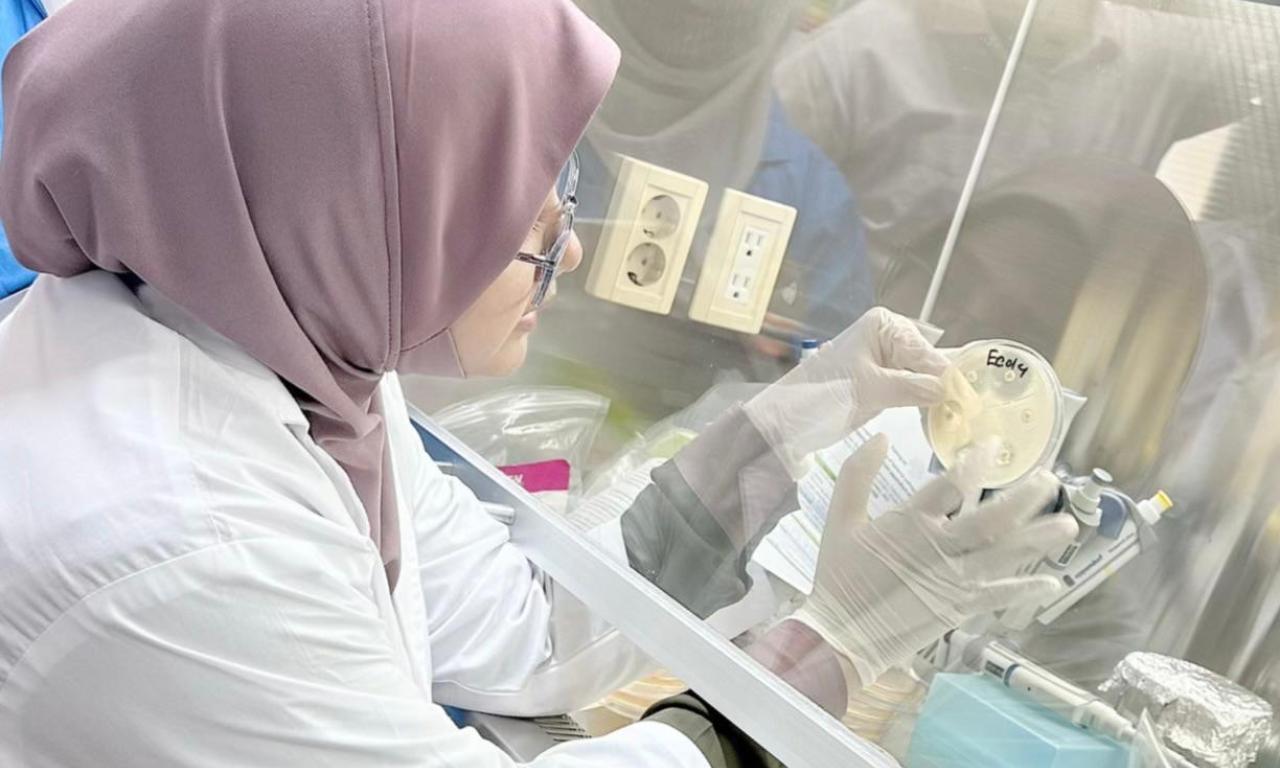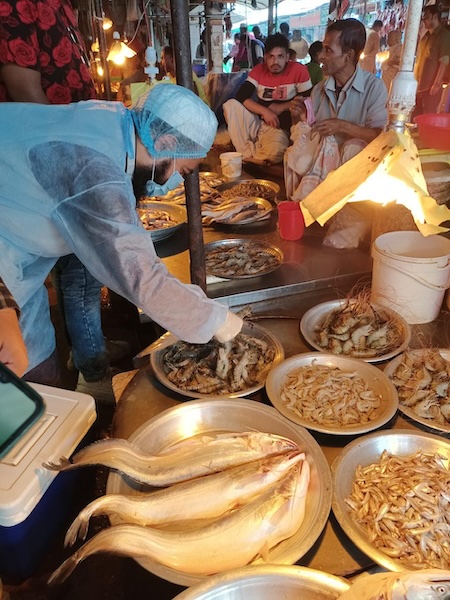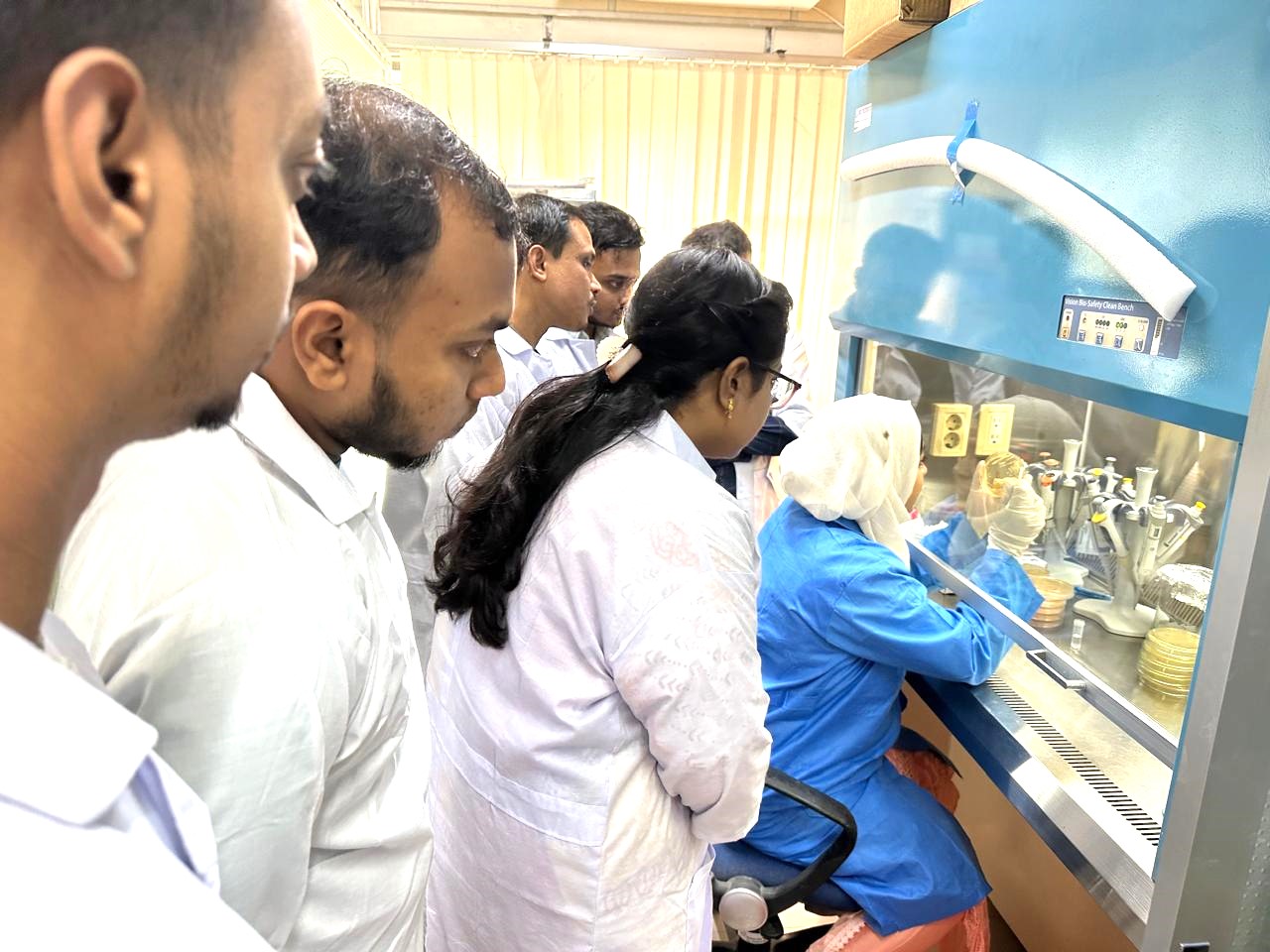
- The mitigation of antimicrobial resistance (AMR) is crucial for safeguarding human, animal, and environmental health and promoting sustainable aquaculture in Bangladesh.
- In 2023, WorldFish conducted 4 trainings covering wider aspects of AMR testing in the laboratory, including sample collection, necropsy, bacterial species isolation, DNA extraction, and molecular identification and antimicrobial susceptibility testing (AST) to assess the resistance profile of One Health significance pathogens from aquaculture samples.
- A total of 31 people from the Department of Fisheries (DOF), Bangladesh Livestock Research Institute (BLRI), Poultry Research and Training Center (PRTC), and Khulna University participated in the training.
Antimicrobial resistance (AMR) occurs when infection-causing microbes—such as bacteria, viruses, parasites, and fungi—become resistant to the medications designed to treat them. According to the World Health Organization (WHO), AMR is one of the top ten public health concerns globally, with the risk being significantly higher in low- and middle-income countries.
Like many other agri-food systems, aquaculture can be a source of AMR pathogens, which can emerge and spread within these environments. In Bangladesh, aquaculture plays a central role in the economy and food security, making AMR stewardship in this sector crucial for protecting human, animal, and environmental health, as well as ensuring its sustainability. Recognizing the urgency of this issue, WorldFish has taken a proactive approach to address AMR in Bangladesh's aquaculture sector.

In 2023, WorldFish conducted in total 4 hands-on training sessions to develop technical skills in various aspects of AMR testing, including sample collection, necropsy, bacterial isolation, DNA extraction, and polymerase chain reaction (PCR) identification of bacteria.
Training Government Technical Personnel in Aquaculture Sample Collection, Necropsy, and Processing for AMR Surveillance
A two-day-long training program on fish and shrimp specimen collection and transportation was conducted on January 24-25, 2023, for AMR surveillance, which was organized by the DOF and jointly supported by WorldFish and Fleming Fund Country Grant to Bangladesh (FFCGB). A total of 10 participants from the Quality Control Laboratory of the DOF, BLRI, and PRTC attended the training session.
AMR surveillance is important for the early detection of resistant pathogens and for showing evidence-based strategies to fight against AMR. WorldFish trained the participants to conduct AMR surveillance in aquaculture by building their capacity in the detection of antimicrobial-resistant bacteria and their resistance patterns.
Participants were taught how to collect fish and shrimp samples from the wet markets in Savar City, Dhaka, by maintaining biosafety and hygiene (e.g. wearing personal protective equipment (PPE), using sterile consumables and equipment in handling), transporting the samples in the laboratory by ensuring the cold chain using icebox with ice packs and perform necropsy to collect skin swab, gill, liver and intestine samples to isolate bacteria for antimicrobial susceptibility (AST) testing.

Training Academics, lab Technicians, Research Students, and Government Personnel on Bacterial Isolation and Identification and AST for AMR Surveillance
An inclusive training program covering three separate sessions (3-5 April, 10-12 July, and 26-27 November 2023) was held in the WorldFish-Khulna University joint Molecular Genetics Laboratory at Marine Resources Technology Discipline (FMRT), Khulna University, Bangladesh, aimed to enhance the technical skill of academics, researcher, quality control officer, research students and laboratory technicians. A total of 21 participants representing DOF, Bangladesh Fisheries Research Institute (BFRI), and Khulna University attended the training session.
"Antimicrobial resistance poses a significant challenge to both human and animal health. WorldFish improved research skills by offering laboratory-based training on sample collection, extraction, PCR, and antimicrobial susceptibility testing and contributing to better laboratory practices," said Dr. Shaikh Tareq Arafat, Associate Professor, Khulna University.
In the first training session, participants were taught how to collect fish and shrimp from wet markets and execute necropsies following aseptic techniques, prepare enrichment and selective media for Salmonella spp. and Escherichia coli. The participants learned how to store bacterial cells at -80°C by employing glycerol and enrichment broth stock solution for many years.
Using a magnetic bead-based lysis buffer approach, bacterial DNA extraction was demonstrated in the second training session. A Qubit 4 fluorometer was used to quantify DNA to get the precise DNA concentration needed for PCR analysis. In addition, the participants received hands-on training on PCR mixture preparation with species-specific primers and agarose gel electrophoresis.
"The molecular and AST trainings helped me to gain skills such as PCR technique and AST, which accelerates my knowledge. I learned about the core concept and practical implementation of PCR and AST, and I believe these technical skills will help me in my future studies and my professional life", said Md. Adnan Sajib, Masters Student, Khulna University.
The final training session covered antimicrobial susceptibility testing (AST), which included tryptic soy agar (TSA) and Mueller Hinton agar (MHA) plates preparation, bacteria inoculation and incubation, turbidity measurement with a McFarland standard, impregnation with antibiotic discs, and inhibition zones measurement according to the Clinical & Laboratory Standards Institute (CLSI) guidelines.

These in-depth training sessions equipped aquaculture researchers with the skills and knowledge necessary to conduct AMR surveillance in aquaculture settings. These initiatives assist in the advancement of responsible antimicrobial use (AMU), disease diagnosis, enhanced surveillance and monitoring systems, and sustainable aquaculture practices.
These activities were conducted as part of the CGIAR One Health Initiative's "Protecting Human Health through a One Health Approach," aimed at enhancing the capacity of technical personnel for AMR surveillance. For safeguarding human and animal health, conserving the environment, and ensuring the long-term viability of the aquaculture industry in Bangladesh, AMR in aquaculture must be addressed.

